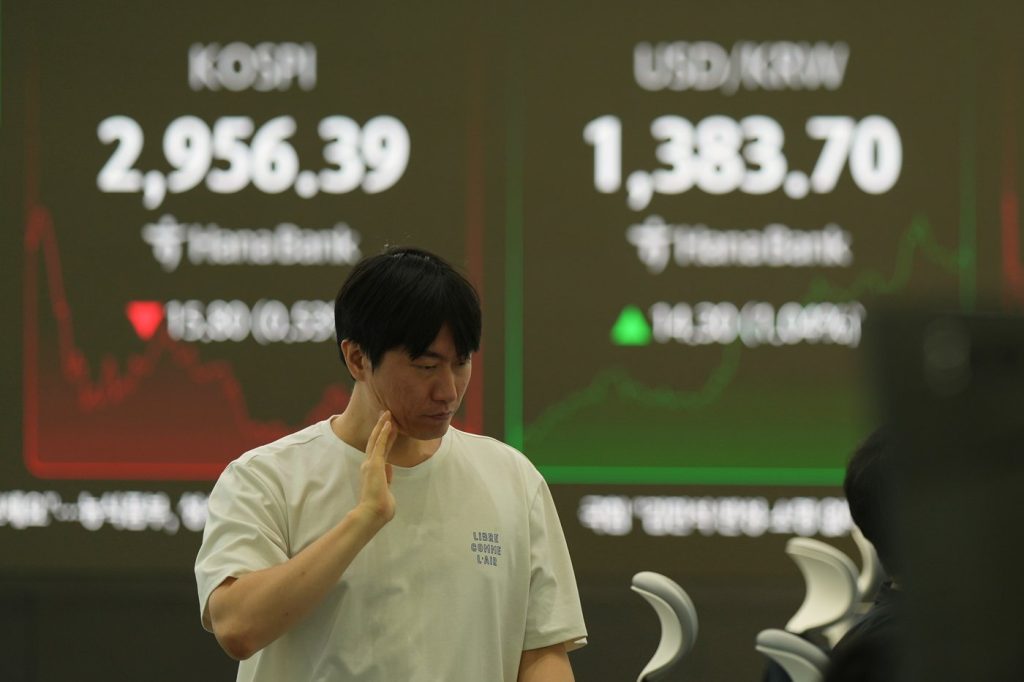TOKYO (AP) — Asian shares faced a decline on Thursday as persistent concerns about ongoing conflict in the Middle East weighed heavily on investor sentiment.
Amid increasing tensions, President Donald Trump signaled the potential for direct U.S. involvement in the conflict with Israel, while Iran’s supreme leader outright rejected U.S. demands for surrender. Such developments have not only affected geopolitical stability but have also triggered fluctuations in financial markets.
Consequently, oil prices and U.S. futures saw a downturn. In Asian markets, Japan's benchmark Nikkei 225 index fell by 0.7% to close at 38,619.17. Notably, shares of Japan's Nippon Steel Corp. experienced a slight uptick, gaining 0.8% after announcing its acquisition of U.S. Steel was finally completed despite facing opposition from the U.S. government for over a year.
In Hong Kong, the Hang Seng Index dropped significantly, losing 2% to settle at 23,231.48, driven by heavy selling in technology-related stocks. The Shanghai Composite followed suit, declining by 0.9% to finish at 3,359.78. Meanwhile, Australia's S&P/ASX 200 remained relatively stable, ending the day at 8,528.30, while South Korea's Kospi experienced a minor loss of 0.4%, closing at 2,960.81.
On Thursday, U.S. financial markets remained closed in observance of the Juneteenth holiday. The preceding day, U.S. stock markets concluded with mixed results as the Federal Reserve suggested the possibility of cutting interest rates twice in the current year. However, uncertainties surrounding the economic outlook keep this scenario far from guaranteed.
The S&P 500 ended the day nearly unchanged at 5,980.87, with the Dow Jones Industrial Average slipping by 0.1% to 42,171.66, while the Nasdaq Composite managed a modest increase of 0.1% to reach 19,546.27. Treasury yields exhibited some volatility but largely maintained stability after the Fed's projections indicated a readiness among officials to lower the federal funds rate twice by the end of 2025.
This anticipated reduction could lead to lowered costs for mortgages and credit card payments, potentially boosting the U.S. economy. However, it could also contribute to rising inflation, a concern given that current inflation levels remain relatively tame and close to the Fed's target of 2%.
Despite warnings from economists regarding the delayed effects of tariffs on inflation, recent spikes in oil prices attributed to Israel's ongoing conflict with Iran have added pressure. Fed Chair Jerome Powell emphasized that the uncertainty surrounding tariffs necessitates a cautious approach, noting that the median forecast for potential rate cuts this year is not set in stone.
According to Powell, the strength of the economy allows for time to evaluate how tariffs will impact inflation and overall economic growth before making decisive rate adjustments. He remarked on the importance of waiting to understand the full implications of inflation and its influence on spending and hiring.
A recent report indicated a slight decline in the number of workers applying for unemployment benefits, potentially pointing to a decrease in layoffs. However, another report showed that homebuilders initiated fewer projects than anticipated, signaling that rising mortgage rates could be negatively impacting the housing market.
In early Thursday trading, benchmark U.S. crude oil prices dropped by 10 cents to $73.40, with Brent crude, the international standard, falling by 24 cents to $76.46 per barrel. Oil prices have exhibited volatility amid fears that escalating conflicts between Israel and Iran could threaten global crude supplies, especially given Iran's significant production capabilities and its control over critical shipping routes.
In the currency markets, the U.S. dollar depreciated slightly against the Japanese yen, moving from 145.13 to 145.05. The euro also weakened, dropping to $1.1468 from $1.1484.











